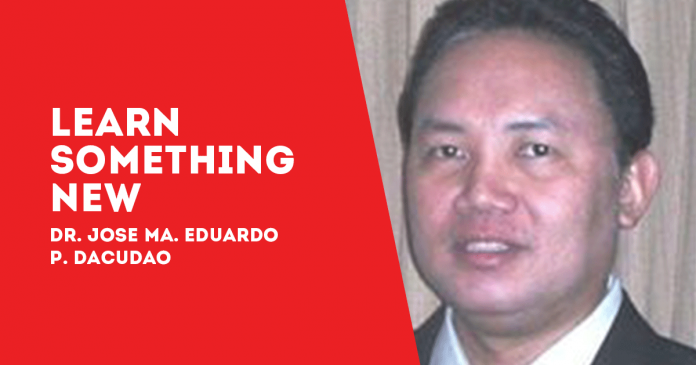
BY DR. JOSE MA. EDUARDO P. DACUDA
THIS short story (poem) is dedicated to the minority ethnolinguistic peoples of the world. If your language and people are dying, you could substitute in the name of your language, your people, and your land, and it should also work out for you, in your travels through time, imagination, and alternate realities. And remember once you are back, we can change our present reality for the better. Safe travels.
The Last Bacolodnon on Earth
(Short story narrative version)
By Jose Ma. Eduardo P. Dacudao
I was a stranger in a strange land.
The place was a Bacolod that the future to us is bringing, except it
was Tagalog that all the residents were speaking. No Ilonggo
speakers left; none in the rippling walkways, none in the twisted
highways, none in the dark gray housings, none in the smoky
buildings; a culture of its soul reft.
The citizenry were as shadows meandering, a pervasive flat hum,
continually conversing. These shades crowded my dulled ears with
an indistinct sound buzzing; the usual low pitched static of a mindless
mob murmuring.
But even this was wrongly askew. Pray please, you ghosts, tell me
what is due? I strained the air for a refrain of my ancient tongue; but
the dead air was empty, all melody had gone.
My heart thudded, I knew panic had come. I wanted out; may this
nightmare be done!
I spotted a passerby, she seemed more real than the rest. She was
rounding a corner; after her I did run my best. I stopped her quick to
query, a desperate final request.
“Where to have all the old Bacolodnons gone?
She stared surprised, “But they’re extinct save for one”.
I looked at her in confusion, uncomprehendingly, but her voice felt
familiar as she answered me kindly.
“In its extreme obsession for nationalism, a one nation one language
Unitarianism; if I may say so sir; do you not recall, the state made
Tagalog the language for all. And so it was perforce taught, in all
schools to all the Negrosanon youth. Ilonggo lost its value; our
ancestors stopped speaking it as they should.”
Through a wavering dreamscape on and on walked we. Endlessly
bothered, bewildered; how could this be? The streets were the same,
and yet strange and alien; the place known to me, yet hollow and
foreign. Houses and buildings were there. Men, women, children
were there. Dogs, cats, various pets were there. A complete
habitation, infrastructures well-known; yet no way could I ever
mistake it for my own.
For it was not whole. How could this be, a cover without the book, a
book without the ink, a people and culture who had lost their soul?
Through the smoggy streets anon, we walked on, and on, and on.
Through the endless metal and plastic maze, through the silent
crowds of whispering shades, the dreary dreamscape stretched long
and endlessly, forever and ever until finally…
We arrived at a house hazy yet prickly. My friend said, “I shall
introduce you freely to my great grandfather; he speaks Ilonggo since
birth. He is the last Bacolodnon, the last one on Earth.”
“Come, my friend, let’s meet the last Bacolodnon on Earth”.
Droplets of fear condensed on my dry brow. I wiped them; yet my
friend I did follow. I realized now that I trusted her fine. Her face
seemed familiar, somehow kin to mine. We went inside her dwelling
of dried dust. The smog of the land crept right in with us.
We entered her great grandfather’s room, a time in nexus; and
behold, everything past and present was in focus.
The room, door, floor, and furniture were made like ancient woods,
encircled by antique desks, wardrobe, chairs, and shelves of books.
Through ornately designed windows wafted fresh scents of a morning
breeze; and outside the dawn sun lighted the azure sky and the
verdant fields. Sitting on a comfy bed was an old man, still strong and
lean. Bright colors lit the chamber, and it seized me, a thought most
mean.
This is no dream!
We spoke in Ilonggo – in Hiligaynon.
To hear my mother tongue for real just one final time; what life it
brings to hear the language that is truly mine. Now I knew the thing of
lore that rights this land of wrongs. T’was the old man’s speech that
was the sweetest of all songs.
His joy was uncontainable, for him the old speech to hear, the old
tongue faithful to the soul of our motherland most dear.
He spoke of the past as though it could last. For truthfully it seemed
more real, my gut-feeling in the spiritual, than the present that was
meaningless and the future doomed to hopelessness.
Patiently I waited for the end of his long story. Then I asked him my
terse question in a voice of worry.
“Just how did this thing happen that our people are now dead?”
He looked at me straight in the eye, and in a sad voice said:
“You only have to look at yourself.”
Kaleidoscope of light and dark and rainbow chasing colors, the
universe disintegrating, sights and sounds and odors. Stomach
rumbling, nauseous, I felt myself to dodder. Peering at his ancient
face, I nearly tumbled over.
But how, I was looking at myself!
The old man was real as me, a jaded sad much older me, a lone and
lonely same of me. The last of my people was me!
Shocked, I woke up, and for certain I knew. If Negrosanons would act
overdue, if we would not move today as we should, and fail to
redeem ourselves and our youth, to stop monolinguistic nationalism,
as hard as we could, the time will come as sure as the sun sets,
when each and all of us would:
Be that old stranger in a strange land./PN



